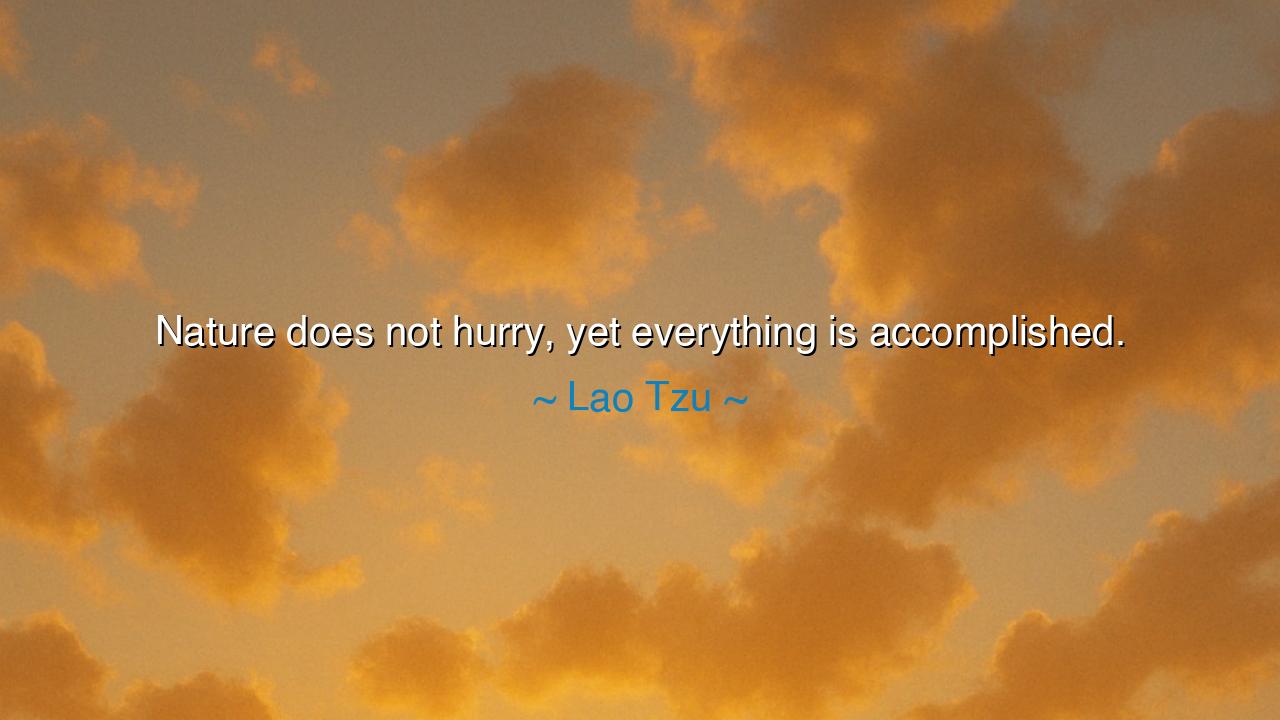
Nature does not hurry, yet everything is accomplished.






"Nature does not hurry, yet everything is accomplished." So taught Lao Tzu, the ancient sage of China, whose wisdom has flowed across centuries like the still waters of a deep river. In this gentle yet mighty phrase, he reveals the mystery of the Tao: that the way of the universe is neither rushed nor restless, yet it fulfills all things in their appointed time. The sun does not race, yet it rises each day. The tree does not strain, yet it grows to mighty height. The river does not run with haste, yet it carves valleys and sustains life. Thus, Lao Tzu shows us the power of stillness joined with patience.
The ancients observed that man, in his restlessness, often destroys what he seeks to build. He hurries his crops before their time and reaps only emptiness; he hastens in anger and brings ruin upon himself; he grasps for wealth and loses peace. But nature, in her quietness, abides by rhythm and balance. Spring does not come before winter has ended; fruit does not ripen before the blossom has withered. Yet in the end, all is completed, and life renews itself. Lao Tzu’s words remind us that what is done without haste is often more enduring than what is seized in frenzy.
Consider the story of Mahatma Gandhi, who led India’s struggle for freedom not through the violence of haste, but through the patience of nonviolence. For years, his movement seemed slow, too gentle against the iron fist of empire. Yet like the steady growth of a tree, his persistence bore fruit. His strength lay not in rushing, but in steadfastness, and in time, the chains of colonial rule were broken. Like nature, he did not hurry, yet he accomplished what seemed impossible.
This wisdom also speaks to the journey of personal growth. A child learning to walk does not rush, yet step by step, the path opens. A student mastering a craft may labor for years before brilliance is revealed, yet each slow movement is progress. The accomplishment comes not from frantic striving, but from steady devotion. Just as the river wears down the stone not through violence, but through persistence, so too do our greatest victories emerge not from haste, but from patience joined with endurance.
But let us not mistake Lao Tzu’s teaching for idleness. To do nothing is not the way of nature; to move in harmony is. The seed must fall to the earth, the root must seek water, the sprout must reach upward. Action is required, but action without anxiety, effort without force. The hurry is what destroys; the steady labor is what completes. To live by this truth is to be both active and at peace, to labor without frenzy, to trust the unfolding of time.
The lesson is clear: when storms rise within you, remember the way of nature. Do not demand of yourself the fruit before the season, nor curse the path for being long. Let each day be its own step, let each effort be its own offering. Trust that what must be accomplished will be, if only you persist without panic. Like the tree, like the river, like the sun—move forward, but without haste.
Practically, this means cultivating habits of patience. When faced with a great task, break it into small steps, and honor each step. When life tempts you to rush, breathe deeply and remember the slow rhythm of the seasons. Offer gratitude not only for achievements, but for the process itself. Meditate, walk among trees, watch the flow of rivers, and learn their language. In doing so, you align yourself with the eternal way of the Tao.
So let these words be carried on: “Nature does not hurry, yet everything is accomplished.” Teach them to your children, remind them to your companions, and whisper them to yourself in times of restlessness. For in the stillness of patience lies the power of the universe, and in the rhythm of nature lies the secret of enduring accomplishment.






AAdministratorAdministrator
Welcome, honored guests. Please leave a comment, we will respond soon